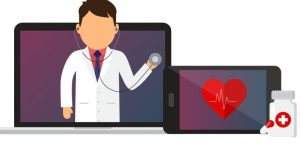
Clinicians have arguably seen the biggest difference in day-to-day operations since Covid-19 shook up the industry.
It has brought on a forward-thinking and fast-paced evolution of the pre-existing standard practices. This adoption of digital technology has paved the way for less cognitive stress and introduced safer, more productive consultation solutions.
However, whilst Covid-19 may not be at its height forever, there are several opportunities and lessons to be learnt as we look to the future.
1. Rapid digital growth is not a short-term solution
The rate of digital transformation during the pandemic has been significant. We are adopting technology at a pace far beyond what we’ve ever seen in the healthcare industry. Its success has opened many doors and driven enormous potential for growth. However, this won’t suddenly stop when the pandemic ends.
We’ve seen many clinics and hospitals implementing telehealth solutions, improved automation and further integrating their systems. Key lessons and challenges have since been resolved, leading to increased productivity and faster decision making. It makes you question why the processes weren’t implemented sooner.
Looking to the future, this will force organisations into an ‘adapt or get left behind’ situation. By seeing this new era of technology as a turning stone, we can put secure digital solutions in place now for the long-term benefits.
For Clinicians, the benefit of implementing technology such as telehealth software may seem short-lived: once the pandemic passes, we can safely return to face-to-face consultations. But the savvier out there are already investing in the potential of this digital world; reduced travel time, unlimited geographical reach, and automated follow-up aftercare to name a few.
2. Software usability is more important than ever
Many healthcare organisations have seen immense benefits to the operational changes brought on by Covid-19. However, some have also seen its shortcomings. Jumping head-first into innovative technology can cause a headache down the line if it is not user friendly.
Software usability has always been important to clinicians and administrators, but Covid has exasperated the issues of poor usability. If the solution fails to provide a seamless experience, both patients and doctors are forced backwards into non-personal, jarring telephone calls. Not only does this damage patient satisfaction, but it also makes diagnosis all the more difficult.
It’s imperative to opt for software providers that can improve and adapt their offering as you grow. By utilising solutions that have foreseen the importance of usability, and have the intention of continual development, healthcare organisations can continue to reap the benefits well into the future.
3. Technology will drive better patient care
Prior to the digital transformation that we experienced in 2020, a large demographic of the population was unable to use technology to any great extent. That has since drastically changed. We now see this same group using it proficiently for everything from shopping to keeping in touch with friends and family.
Covid-19 has enabled this change. It has taught a generation the modern mode of communication through the necessity of staying in touch. This new skill has greatly benefitted the healthcare industry already, making it easier to provide remote care. But it has also set the scene for further improvements in patient satisfaction.
Further technology adoptions in the healthcare industry will drastically improve the way we deliver consultations. Effective clinic management software that connects all operations in a simple, yet secure way can allow Clinicians to avoid arduous admin tasks and really focus on delivering first-rate patient care.
A user-friendly patient portal no longer looks daunting to those who may not have previously been too in touch with the internet. Furthermore, solutions that offer transparent payment options, for fast estimates during a video consultation, will entice self-pay patients and encourage loyalty. A friendship with technology is forming. Invest in this now and it will pay dividends in effective patient care moving forward.








